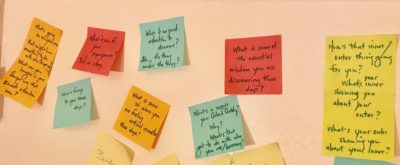
It’s the day that my friend and colleague Quanita and I will be beginning to host a weekend retreat. It’s QT. It runs Friday – Sunday. This time there will be eleven of us. From Boston, Chicago, Columbus, Cincinnati. And me from Lindon, Utah. This time, we are seven men and four women. It’s deliberate curious wander together which has a way of resetting the internal compass for most. It’s a gathering that I love and that has become even more deeply enriching each time.
I’m thinking a bit, on the day that QT begins, about some of the questions and topics that I’m bringing to the retreat. That I want to learn about. That I want to hear and share stories about. Wisdom. Connection. Funny. The relationship of inner to outer. The relationship of now to the long arc. Dreams. Ritual. Superpowers. There’s a big list. I know that we might get to two or three. But I’m not worried. It isn’t scarcity of time. I know that these are all connected. And, I continue to learn that it’s the energy, the vibration of the stories shared, the entanglement of our curious wander, that really moves and changes us.
I’ve decided to change some of my topics into questions, writing them on post-it notes. I know that what moves an interesting topic to a kind of communal engagement is a question. And I love feeling the questions come through me. I’m just playing so that I can share them with Quanita to see how they align with her interests and sense of the group coming. Hmm…
On wisdom — What is some of the essential wisdom you are discovering these days?
On connection — What is some of where you are feeling critical connection these days?
On funny — What is some of what is funny to you these days?
On inner / outer — How’s that inner / outer thing going for you? What’s your inner showing you about your outer? What’s your outer showing you about your inner?
On superpowers — What is one of your superpowers? Tell a story.
These are a sample, but after Quanita made a few observations and appreciations about these kinds of questions, I realized that there is a pattern to them that helps them be useful for engagement.
- Ask for some, not all (“…what is some of…”) — This presumes that none of us can say all of it. We can try. We can be rather clever. Or articulate. Or just brilliant. But “some of” is an invitation to freedom of choice. It’s also an orientation that acknowledges it’s not possible to get all of it. Language and words are great tools. And needed. The kicker here is to welcome the spirit of wholeness (it’s all connected) yet the freedom or partial and incomplete (yet complete enough).
- Ask for feeling, not just data — This presumes that most (or, er…, um…, all) of experience is subjective and not objective. Sure it’s true that we humans make lists and are rather impressive in our quantitative and qualitative sharing. I tend to be one that wants to reclaim the subjective, the sense-making that is filtered through the rather complex beings that we are with “no two exactly the same.” “What’s your feeling…” returns us to the validity of wonder.
- Ask for these days, not all of time — This presumes the value of just noticing what is alive and apparent now. Or recently. It doesn’t ask for a comprehensive summary of all time. It doesn’t ask of a literature review of all possible responses. It just asks for some of what is current, trusting that what is alive now might have more relevance in a continued emergence kind of way.
I love asking these kind of questions. I love being in these kind of questions. I suppose because it moves me / us into a kind of real time sensing together. It gives us chance to grow in the sun together if I stay with a living systems reference. And, just for fun, more mechanically, it gives us chance to calibrate a bit together.
I’m a student of questions. I’ve had good teachers that have themselves been oriented to being students of questions. There is an essence in the question that creates a doorway to shared meaning making, sensing, witnessing. What a delicious taste of it I got with this lovely group of people in weekend retreat. Enriched.
